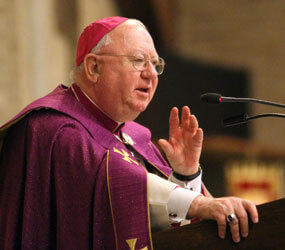ROCKVILLE CENTRE, N.Y. – To “ensure the financial health” of the Rockville Centre Diocese for the future, the diocese has put in place a strategy to meet a number of fiscal challenges, said Bishop William F. Murphy.
The plan includes offering eligible employees an early-retirement package; establishing a shared services center to help make operational functions more efficient and to strengthen financial controls; and expanding a pastoral administrative team to help pastors focus more on pastoral responsibilities.
“If we are to pass on a church to future generations that is fiscally sound and adequately ministering both pastorally and spiritually to a growing Catholic population on Long Island, we must act now. And that we are doing,” the bishop wrote in his column “Faith and New Works” in the Feb. 3 issue of The Long Island Catholic, the diocesan newspaper.
He said several factors are affecting the diocese’s ability to meet its obligations “and the needs of the people of God and the broader Long Island community.”
Chief among them, he said, are steady decreases in Mass attendance over the past 10 years and subsequent decreases in Mass offertory contributions as well as demographic shifts in the communities the church serves, which have increased “the level and scope of services needed.”
Such factors have put “incredible financial stress” on parishes and schools and they must be addressed now “for the future good of the church and the fulfillment of our mission to bring Christ to the world,” Bishop Murphy said.
Last July diocesan officials began an analysis of the diocese’s financial situation. Meetings were then held with pastors to share the data and discuss how to address the situation, allowing diocesan officials to a plan “for a secure mission of the church for the next five years,” he said.
A decision was made to offer a voluntary early-retirement package for employees of parishes and other diocesan entities who qualify. Those whose combined age and years of service total 65 or more qualify. Out of the diocese’s 6,000 employees, about 1,800 part-time and full-time workers are eligible for the buyout.
In addition the diocese will undertake a “structured employee evaluation and management program” to retain and hire employees most qualified to achieve the “church’s mission now and in the future,” according to Sean Dolan, diocesan director of communications.
Key features of this component, he explained, will include better aligning staff to responsibilities; testing employees’ skills and verifying their qualifications; establishing job titles, qualifications and salary ranges; setting performance expectations and standards for each employee; and establishing a structure for merit-based salary increases.
A “shared services arrangement” also will be established whereby the diocese will assume responsibility, under contract, for many services currently provided by parishes or other entities, allowing operational functions to be performed more efficiently and more cost effectively and for financial discipline and controls to be strengthened, according to Dolan.
The diocese has more than 200 entities, including parishes and schools, Catholic Charities, parish outreach and prison ministry programs, the seminary, communications outlets such as the Telecare TV ministry and The Long Island Catholic newspaper, and Catholic cemeteries.
The diocese’s five main areas of service are: pastoral, including liturgy and the sacraments; education; Catholic Charities and parish outreach; priestly and religious vocations; and faith formation.
“In the past 50 years our diocese has grown and it has also seen many changes and many new challenges and opportunities,” Bishop Murphy said in his column. “We have always met them together, whether it was forming new parishes, consolidating schools, developing parish outreach or deepening our love of the Lord in the Eucharist.”
Bishop Murphy said that currently many of the parishes and schools in the diocese “are financially sound.”
“However,” he continued, “an alarming number are currently struggling to stay viable. Current analysis shows that up to 100 parishes in the Diocese of Rockville Centre either have or shortly will have operating deficits. Some parishes have had to use cash reserves to pay employees and subsidize their schools.”
Investment losses brought about by the nation’s recent financial crisis have played a major role in the diocese’s finances, Bishop Murphy said.
He pointed to reduced savings and capital as well as “dramatically increasing payroll, health care and pension expenses” and increasing building maintenance expenses on aging infrastructure. “In addition, we have significant unfunded pension liabilities and significant future building maintenance costs,” he said.


